Text/Jinyang.com reporter Hou Mengfei Tan Zheng
With the long-standing history, the books of heroes shaved by time are still radiating the dazzling light of ideals and beliefs.
This light –
It was Ye Ting’s determination to apply to join the Communist Party of China less than a day after he was released from prison;
It was Peng Pai and Yang Yin who jointly wrote a letter to the Party Central Committee in prison in Shanghai, and he would rather sacrifice himself for the revolution;
It was Su Zhaozheng and Zhou Wenyong who wrote down their consistent loyal beliefs and original feelings for the Party at the last moment of their lives…
Following these lights of ideals and beliefs, let us get closer to history, relive the spiritual power brought by the red script of the heroes, and appreciate the original aspirations and mission of the Communists.
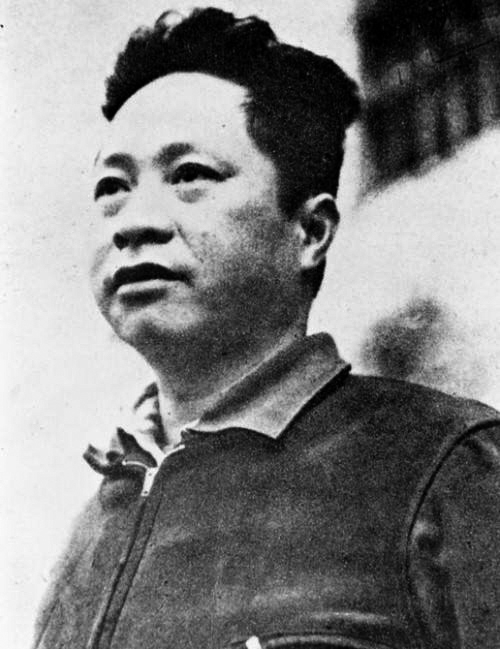
Ye Ting
Ye Ting
Leave less than one day after he was released from prison, and handed over his second application for joining the party
“I was released from prison last night.
I am determined to fulfill my wish for many years, join the great Communist Party of China, and under your leadership, contribute my everything to the liberation of the Chinese people.”
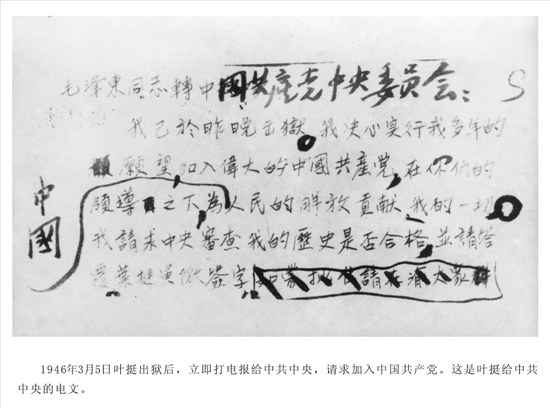
This is the second application for joining the party written by Ye Ting in March 1946. It was less than a day since he was released from prison. A few words condense Ye Ting’s ideals and beliefs of being extremely loyal and unremittingly pursued for the revolutionary cause.
Ye Ting was a famous general of the Northern Expedition and one of the main leaders of the Nanchang Uprising and the Guangzhou Uprising. After the outbreak of the full-scale war of resistance, he served as the commander of the New Fourth Army led by the Communist Party of China. During the Southern Anhui Incident, Ye Ting was unreasonably detained by the Kuomintang and later spent more than five years in prison. After being released from prison, the first thing he did was to reapply for joining the party. The first thing to do after being released from prison is to apply for re-application to join the party
Ye Ting’s application for joining the party is still kept in the Central Archives. On March 4, 1946, Ye Ting, who was detained by the Kuomintang for five years and two months, was finally released. Not after being released from prisonOn a day when Babaylan, Ye Ting called the Party Central Committee and requested to join the Communist Party of China. He wrote in the telegram: “Comrade Mao Zedong sent to the Central Committee of the Communist Party of China: I was released from prison last night. I am determined to fulfill my wish for many years, join the great Communist Party of China, and under your leadership, contribute my everything to the liberation of the Chinese people. I ask the Central Committee to review and check whether my history is qualified and please reply.” This has been more than 20 years since Ye Ting wrote to the Moscow branch of the Communist Party of China. What kind of tortuous story is behind it?
In 1896, Ye Ting was born in a poor farmer’s family in Guishan, Guangdong (now part of Huiyang). In 1919, he devoted himself to the democratic revolution led by Sun Yat-sen. In 1924, with the first cooperation between the Kuomintang and the Communist Party, Ye Ting began to come into contact with communist ideas, and in this year he went to the Soviet Union to study as a member of the Kuomintang. Joined the Communist Party of China in December 1924.
In 1925, after returning to China, Ye Ting participated in the establishment of the 34th Regiment of the Fourth Army of the National Revolutionary Army with Communist Party members as the backbone (later changed to the famous Ye Ting Independent Regiment) and served as the regiment commander. In May 1926, he led the Independent Regiment as an advance team to go to the Northern Expedition, and was known as a “famous general of the Northern Expedition” for his outstanding military achievements. After the failure of the Great Revolution in 1927, facing the white terror of the Kuomintang reactionaries, Ye Ting participated in the launch of the Nanchang Uprising and served as the commander-in-chief of the front enemy. After the uprising, he led his troops south to Guangdong to continue the revolutionary struggle. In December of the same year, he was appointed by the Party to participate in the launch of the Guangzhou Uprising and served as the commander-in-chief of the rebel military. After the failure of the Guangzhou Uprising, influenced by the erroneous “left” ideas within the party, the Guangdong Provincial Party Committee at that time was punished by Ye Ting for six months on probation. After that, Ye Ting wrote a detailed report on the Guangzhou Uprising in Moscow to the party organization, but was severely criticized and attacked by Miff, Minister of the Eastern Department of the Communist International and Wang Ming. Ye Ting was forced to leave the party and lived abroad for nearly 10 years.
Stand out at a critical moment, and the Southern Anhui Incident was imprisoned
History has proved that the accusations against Ye Ting at that time were completely wrong. Although Ye stood up overseas, he was still concerned about the Chinese revolution.
After the September 18th Incident in 1931, Ye Ting returned to Macau from abroad, and he tried every means to find the party organization. In 1937, when the Anti-Japanese War broke out in full swing, Ye Ting left Macau and went to Shanghai, confides to Zhou Enlai with his strong desire to return to his motherland to participate in the anti-Japanese cause, and resolutely accepted the mission of forming the New Fourth Army. Ye Ting made outstanding contributions to China’s war of resistance against Japan, and Mao Zedong praised him for “leading the war of resistance and outstanding contributions.”
In January 1941, the Kuomintang stubbornThe Gust faction created the Southern Anhui Incident that shocked China and the world. Ye Ting was illegally detained by the Kuomintang authorities and was displaced in Shangrao, Chongqing, Enshi, Guilin and other places. Although he was no longer a Communist Party member when he was imprisoned, he still fully demonstrated the firm ideals and beliefs and revolutionary beliefs that Communists should have.
Although the Kuomintang coerced and tempted Chiang Kai-shek personally persuaded surrender, Ye Ting was still unmoved. While being imprisoned in the cell of the Hongfu Factory of the Chongqing Sino-US Cooperation Institute, he wrote the famous “Prison Song”, saying that he would never “climb out of the dog’s hole” and would “get immortality in the fire and blood.”
Requesting to join the party again was the result of more than five years of consideration
After the victory of the Anti-Japanese War, Ye Ting was released on March 4, 1946 after the rescue of the Central Committee of the Communist Party of China. After being released from prison, the first thing Ye Ting did was to call the Party Central Committee and request to “join the great Communist Party of China.”
This telegram soon arrived in Yan’an. Mao Zedong personally revised the reply and issued a sign language finalized as “Dear Comrade Ye Ting”, showing his love. The re-design fully affirmed that Ye Ting had “more than 20 years of struggle” for the cause of liberation of the Chinese nation and the people, highly praised Ye Ting’s “infinite loyalty to the nation and the people”, decided to accept his joining the Communist Party of China, and extended his “warm condolences and welcomes”.
Yang Jianwei, director of the Party History Research Office of the Provincial Party Committee, said: “Ye Ting’s application to the Party Central Committee for joining the Party is only 69 words, but every word is huge, and the innocent loyalty of the Party for the people is vividly revealed on the paper.” After receiving the reply from the Central Committee, Ye Ting once told the newspaper reporter the reason for his rejoining the Party. He said that requesting to join the Communist Party of China the day after he was released from prison was the result of more than five years of consideration, because only the comrades of the Communist Party of China are truly working for the happiness of the Chinese people. He is determined to rejoin the Communist Party, contribute all his strength, and serve the Chinese people.
Yang Jianwei believes that joining the party is the most important choice faced by a Communist Party member in his life, and it is also the most solemn promise he makes to fulfill the party’s original aspiration and mission. Ye Ting has set an example for the Communists with practical actions. At the moment when the whole party is carrying out the theme education of “Never forget the original aspiration and keep the mission in mind” in an all-round and in-depth manner, it is time to review Ye Ting’s application for joining the party.
Peng Pai Yang Yin
Defend his lofty faith with his life
In August 1929, Peng Pai and Yang Yin were arrested in Shanghai. This is a letter they wrote to the Central Committee of the Communist Party of China in prison before the execution. When they were about to be executed, they sang the Internationale, shouted revolutionary slogans, died bravely, and defended their lofty faith with their lives.
Peng Pai and Yang Yin were both early leaders of the Communist Party of China. One of them was born in a landlord family and the other was born in a prominent family.He lives a prosperous and decent life, but resolutely devotes himself to the cause of national independence and people’s liberation. In the end, Peng Pai grew up to be the pioneer of the Chinese peasant revolutionary movement and the founder of the famous Hailufeng Soviet regime, while Yang Yin became an important leader in the early military work of the Communist Party of China and a famous leader of the workers’ movement.
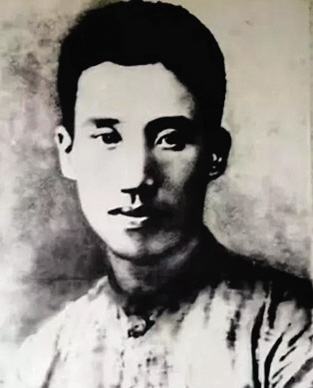
Peng Pai
Peng Pai
Brothered from a landlord family, but became the “king of the peasant movement”
Peng Pai was born in a landlord family in Haifeng County, Guangdong Province. In 1921, Peng Pai, who had been in Japan for four years, returned to his hometown. As soon as he returned to Haifeng, he devoted his enthusiasm to the movement to spread socialist ideas and transform Chinese society.
Jiang Jiannong, professor at the School of History and Culture of South China Normal University, introduced that within the Communist Party of China, Peng Pai was the first leader to turn his attention to rural areas and farmers. In the summer of 1922, in the fields of Haifeng rural areas, busy peasant brothers could always see a “literary man” wearing student outfits and white hats. This “literary man” is Peng Pai.
Although he tried his best to integrate, he could never get close to the farmers. So, the students changed their clothes into coarse cloth short shirts and white hats into ragged hats. Peng Pai, barefoot, stepped on the muddy field path, once again penetrated into the Cinema farmers, mobilizing and organizing farmers to participate in the revolution.
In order to ignite the enthusiasm of farmers to participate in the revolution, Peng Pai took the lead in burning the field certificates distributed to him and won the trust of farmers. The raging fire of the peasant revolution ignited from Haifeng. The Guangdong peasant movement he led was the forerunner of the national peasant movement during the Great Revolution, and effectively promoted the rapid development of the national revolution and was praised by Mao Zedong as the “king of the peasant movement.”

Yang Yin
Yang Yin
Sales all savings to solve the funds for the party’s activities
In 1892, Yang Yin was born in a prominent family in Cuiheng Village, Xiangshan (now Zhongshan City), Guangdong Province. As a grandsonA fellow countryman from Zhongshan, he participated in the China Tongmenghui in 1911, followed Sun Yat-sen, and was Sun Yat-sen’s personal bodyguard and adjutant, and was deeply trusted. “But after witnessing the warlords fighting and the people were living in miserable life since the Xinhai Revolution, and the Kuomintang fought for power and profit and had many contradictions, he realized that the Kuomintang was limited by its own class limitations and could not lead the realization of the Chinese nation and the liberation and happiness of the entire Chinese people. He then looked for a new revolutionary path.” Jiang Jiannong introduced.
After the outbreak of the May Fourth Movement, Yang Yin began to study Marxism-Leninism and joined the Communist Party of China in 1922. “At that time, the CCP had only 195 party members in the country, with weak strength and tight funding, and its future was uncertain.” Jiang Jiannong introduced that Yang Yin sold all his savings, his hometown and the jewelry left by his late wife to the party, and resolved the funding for the party’s activities. In 1923, after returning from the Soviet Union, Yang Yin was engaged in the Komiks worker movement and led the establishment of the Guangdong-Hankou Railway Federation Union. In 1925, he participated in leading the provincial and Hong Kong general strike.
Shanghai was arrested, and the revolutionary proposition was still promoted in prison.
In November 1928, Peng Pai was ordered to work in the Shanghai Party Central Committee, served as secretary of the Central Agricultural Commission, and was elected as a member of the Central Political Bureau. At the same time, Yang Yin was added to Babaylan and member of the Standing Committee of the Political Bureau of the Central Committee, served as Minister of the Central Military Affairs Office, and assisted Zhou Enlai in the Party Central Committee in Komiks.
However, in August 1929, five people including Peng Pai, Yang Yin, Yan Changyi, Xing Shizhen, Zhang Jichun were arrested in Shanghai and detained in Longhua Prison due to the betrayal of the traitor Bai Xin. In prison, they were tortured, but they still promoted revolutionary propositions to the people in the same prison and the Kuomintang soldiers. This is described in their letter to the Chinese Communist Party Central Committee.: The soldier “After listening to us, he sighed and beat his chest.”
Peng Pai made a generous speech in prison: “As long as I have a breath, I will fight for the cause of communism to the end!” “In the near future, we will definitely be able to overthrow the reactionary rule and establish the Soviet regime across the country.” “For our descendants to fight for a happy life, we will sacrifice our lives.” Faced with the enemy’s coercion and temptation, Yang Yin looked at death as if he was home: “I will never surrender. You have your beliefs. I have my ideals and beliefs, and I only believe in communism! After the severe winter, spring is spring. I firmly believe that the cause of China’s revolution will surely win!”
On August 30, 1929, on the morning of the day of execution, Peng Pai and Yang Yin jointly wrote a letter to the Central Committee of the Communist Party of China to report on the situation of the struggle in prison and put forward opinions on rescuing comrades. The letter stated that if the party organization cannot rescue the five comrades who were arrested at the same time, then Peng and Yang can be sacrificed and tried to rescue the other three.
Afterward, Peng Pai and Yang Yin jointly wrote a letter to Zhou Enlai, the leader of the CPC Central Committee, saying, “We are in good spirits here.” He urged comrades to “not be sad because of the sacrifice of my brother and others.” “I hope to take care of my health!” At this time, they had put their personal life and death aside, and what they thought was only the cause of the party and the safety of their comrades!
When they were executed, they chanted the Internationale, shouted revolutionary slogans, and died bravely. They defended the lofty belief of communism with their lives. Jiang Jiannong believes that as the prides of the land of Guangdong, Peng Pai and Yang Yin, in order to save the country and the people, ruin their families and relieve their difficulties, sacrifice themselves for the party, devote themselves to the cause of national independence and people’s liberation, and wrote the original aspirations and mission of the Chinese Communists in their blood.
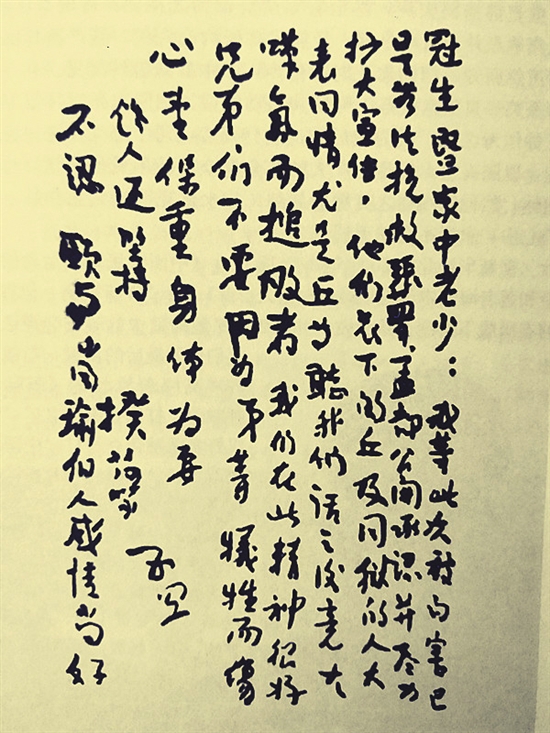
Letter written by Peng Pai and Yang Yin to the Party Central Committee before their death
Notes
Letter from Peng Pai and Yang Yin to the Party Central Committee before their death①
Guansheng② and the young and old in the family:
We were irrescued by this time④. Zhang, Meng, Meng, and Meng all publicly admitted it and tried their best to expand publicity. Qiu ⑥ and the people in the same prison expressed great sympathy. Especially Qiu and others, after hearing our words, they sighed and beat their chests. We are in good spirits here. Brothers, don’t be sad because of your sacrifice. I hope to take care of my health.
The rest of the people insisted on not recognizing it. Yi and Xiao Yu have a good personal relationship.
Kui Meng Meng
① This is a letter written by Peng Pai and Yang Yin to Zhou Enlai, the leader of the CPC Central Committee, in prison before they were executed on August 30, 1929. It is quoted from the “Chronology of Peng Pai” compiled by Guo Dehong, 2007 edition by the Central Party School Press of the CPC Central Committee, page 463.
② Guansheng, that is, Zhou Enlai.
③The young and old in the family are the relevant comrades in the party.
④Bai is the traitor Bai Xin.
⑤Zhang refers to Zhang Jichun; Meng refers to Yang Yin, Yang Yin’s pseudonym Mengkui; Meng refers to Peng Pai, Peng Pai’s pseudonym Meng’an. Zhang, Meng and Meng were arrested for their traitor’s suspicion that they publicly recognized their identity as Communist Party members and insisted on promoting communism.
⑥Qiu refers to Kuomintang soldiers.
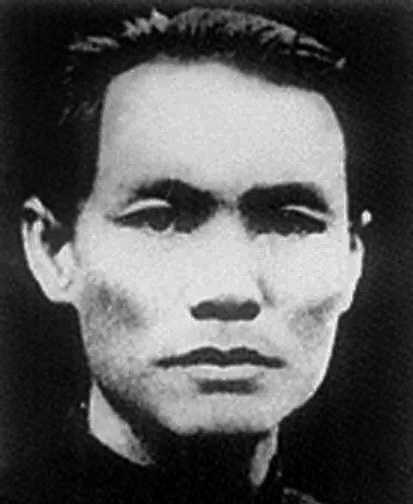
Su Zhaozheng
Su Zhaozheng
Medical care and full-hearted revolution to the end of life
“Everyone works hard together.
Everyone works together and cooperates unanimously to achieve our final success. ”
This will, recorded by Deng Yingchao and noted by Deng Xiaoping, was left by 44-year-old Su Zhaozheng on the hospital bed. Due to long-term struggle in revolutionary work, Su Zhaozheng became ill. In February 1929, after Su Zhaozheng presided over the second enlarged meeting of the All-China Federation of Trade Unions in Shanghai, an old illness broke out. When his life was in danger, he left this will with a faint voice.
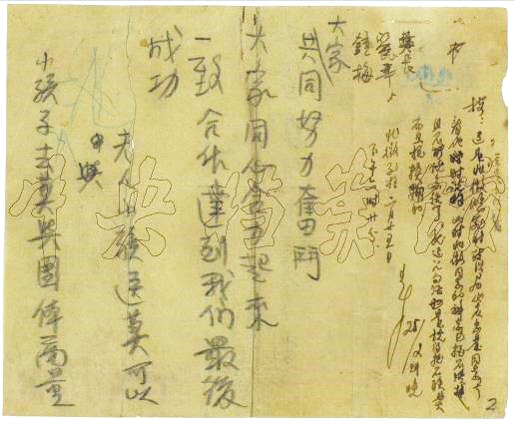
Su Zhaozheng’s Will (Deng Yingchao Record, Deng Xiaoping Note, February 1929)
Meticulous and meticulous care The “Great Steward” in the Provincial and Hong Kong General Strike
In November 1885, Su Zhaozheng was born in Xiangshan, Guangdong (now Zhuhai City). He is an outstanding leader of the workers’ movement of the Communist Party of China. He served as chairman of the Third and Fourth Executive Committee of the All-China Federation of Trade Unions, chairman of the Guangzhou Soviet Government, and member of the Standing Committee of the Political Bureau of the Sixth National Congress of the Communist Party of China. He has participated in leading the Hong Kong seafarers’ strike and the Provincial and Hong Kong general strike that shocked China and the foreign countries, setting off a climax of the workers’ movement led by the Communist Party of China.
After the outbreak of the Provincial and Hong Kong general strike, workers from various industries in Hong Kong left Hong Kong and returned to Guangzhou one after another State. Historical data shows that at that time, there were 70,000 to 80,000 strike workers gathered in Guangzhou. How to properly solve their problems such as food, clothing, housing and transportation? While entrusting Li Sen, the Director of the Officer, to be fully responsible, Su Zhaozheng cared for the food, clothing and other matters of the strikers. Under the care of Su Zhaozheng, Li Sen and others, the Officer formulated the “Dining Regulations” for the canteens in each district.
During the provincial and Hong Kong general strike, in addition to leading the strike, Su Zhaozheng was like a big housekeeper, taking care of the lives of every striker and the worker’s family.
Doing all his heart into revolutionary work Until the last moment of life
February 1929,After Su Zhaozheng presided over the second enlarged meeting of the All-China Federation of Trade Unions in Shanghai, he suffered from long-term struggles in revolutionary work, causing illness and an old illness. As the condition worsened, Su Zhaozheng did not tell other comrades about the disease. It was not until his condition worsened and he was sent to a private hospital for treatment by his family that Su Zhaozheng, who was already in a critical state, met comrades such as Zhou Enlai, Li Lisan, Deng Xiaoping, and Deng Yingchao who came after hearing the news. He struggled hard and in a weak voice, he said, “The people can no longer live, we need revolution, waiting for us to organize. I hope everyone will work together to fight together.” Later, he pointed to his chest and repeatedly said, “Everyone works together and cooperates together to achieve our final success!” At the last moment of his life, Su Zhaozheng still did not forget to organize the mass struggle, and did not forget to emphasize the unity of the party and be full of confidence in the revolutionary cause.
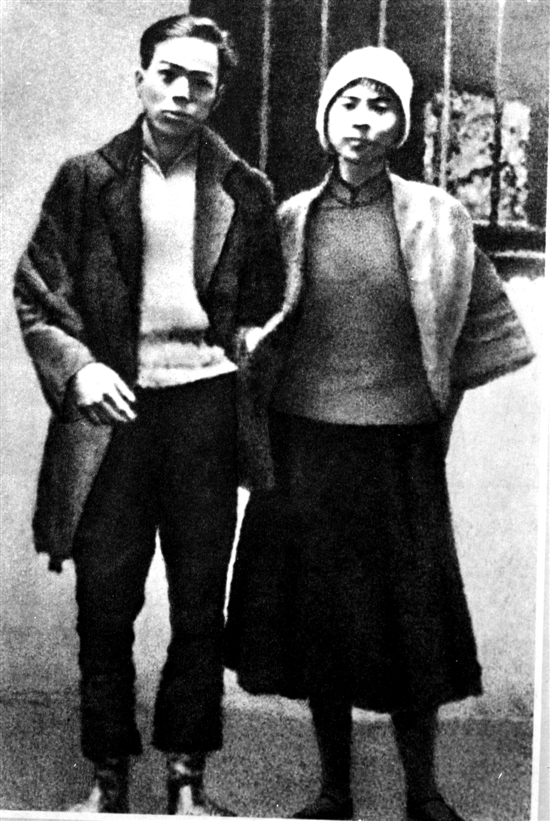
Before the execution, Zhou Wenyong and Chen Tiejun were in the iron window of the cell. href=”https://funnybookish.com/”>CinemaPlanning photo
Zhou Wenyong
“Wedding on the execution ground”, they joined hands to commit suicide heroically
“The head can be broken, the limbs can be broken, the revolutionary spirit cannot be destroyed!
The head of the patriot falls for the party, and the body of the hero is broken!”
This is the last letter left by a martyr who died at the age of 23.
On February 6, 1928, Zhou Wenyong, who was under 23 years old, and his wife, 24-year-old Chen Tiejun, resolutely walked to the execution ground of Honghuagang, Guangzhou, completed the revolutionary wedding amid gunfire, and was executed generously. In 1980, “Wedding on the Execution Field” produced by Changchun Film Studio showed this revolutionary love in front of the world.
Entered to the “Red A-Tech” school and was determined to save China
Zhou Wenyong was born in August 1905 in a poor intellectual family in Kaiping City, Guangdong Province (then known as “Kaiping County”). In 1922, with the support of relatives and friends, Zhou Wenyong was admitted to the Guangzhou Provincial Type A Industrial School, known as the “Red A-level Worker”.
StudyAt the school, Zhou Wenyong came into contact with revolutionary books such as the “Guide” of the Central Committee of the Communist Party of China, and joined the Chinese Socialist Youth League in 1923. In 1925, 20-year-old Zhou Wenyong joined the Communist Party of China. On the eve of the provincial and Hong Kong workers’ general strike, Zhou Wenyong was sent to the Shamian Western Foreign Affairs Union to serve as a leadership position. After many training, he was elected as a member of the Guangzhou Municipal Committee of the Communist Party of China and a member of the Guangdong District Committee of the Communist Party of China.
“Wedding on the execution ground” The love masterpiece of revolutionary couples
After the April 15 counter-revolutionary coup in 1927, Zhou Wenyong moved into underground activities in Guangzhou. Because being single is prone to suspicion, the organization arranged for Chen Tiejun to go to Zhou Wenyong to pretend to be a couple and assist Zhou Wenyong in establishing the Guangzhou Riot Committee.
The Guangzhou Uprising failed in December 1927, and the revolutionary organization was severely damaged and paralyzed. In order to restore the work of the Guangzhou Party Organization, Zhou Wenyong and Chen Tiejun tried their best to find the lost revolutionary comrades in the white and terrifying Guangzhou, and restored the party’s underground liaison point. However, just when the work situation was opened, he and Chen Tiejun were arrested at the same time on January 27, 1928 due to a traitor’s informing.
In prison, the enemy used high-ranking officials, money, freedom, etc. to tempt Zhou Wenyong many times to write a letter of surrender. Zhou Wenyong took a pen and wrote, “The head can be broken, the limbs can be broken, the revolutionary spirit cannot be destroyed! The head of the patriots is the party, and the body of the heroes is the broken!” Before the execution, the enemy asked Zhou Wenyong what his request was, and he proposed to take a photo with Chen Tiejun. Under the iron window, Zhou Wenyong and Chen Tiejun took the last photo as a souvenir for the party and comrades. On February 6, 1928, Zhou Wenyong and Chen Tiejun completed the revolutionary wedding on the execution ground of the reactionaries and were executed bravely. Chen Jinlong, dean and professor of the School of Marxism at South China Normal University, believes that whether it is Su Zhaozheng’s “achieve our final success,” or Zhou Wenyong’s “revolutionary spirit is indelible”, they all show the original intention of the Chinese Communists to seek happiness for the Chinese people and rejuvenation for the Chinese nation. The persistence of the original aspiration and mission has become an inexhaustible driving force for the revolutionary martyrs to move forward and a spiritual wealth passed down from generation to generation by the Chinese Communists. Over the past 98 years, the Communist Party of China has led the people to achieve world-renowned brilliant achievements, but realizing the great rejuvenation of the Chinese nation is by no means an easy task. Only by “not forgetting the original aspiration and keeping the mission in mind” can we comfort our ancestors, move forward and realize the great rejuvenation of the Chinese nation.